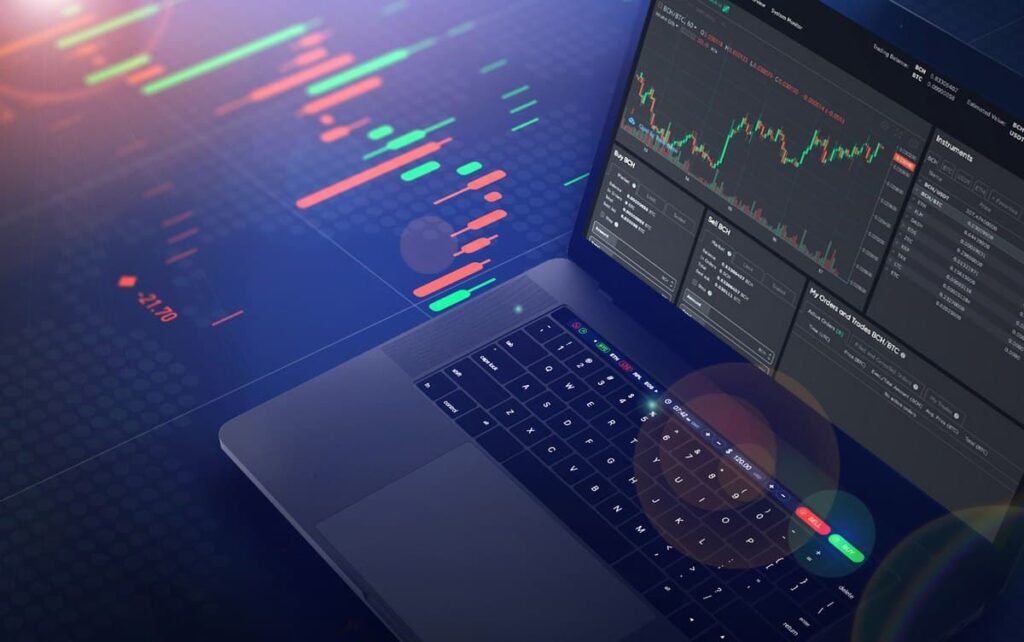The world of digital assets presents countless opportunities for savvy investors, and cryptocurrency arbitrage trading for bitcoin profits stands out as one of the most reliable strategies for generating consistent returns. This sophisticated trading approach capitalizes on price differences across multiple exchanges, allowing traders to buy low on one platform and sell high on another.
With Bitcoin’s growing adoption and the expansion of cryptocurrency exchanges worldwide, arbitrage opportunities continue to emerge daily. Understanding how to identify and execute these trades effectively can transform your investment portfolio and create substantial passive income streams through systematic market inefficiency exploitation.
What is Cryptocurrency Arbitrage Trading
Cryptocurrency arbitrage trading represents a low-risk investment strategy that exploits price discrepancies of digital assets across different trading platforms. Unlike traditional speculation, arbitrage trading relies on mathematical certainties rather than market predictions. When Bitcoin trades at $45,000 on Exchange A and $45,200 on Exchange B, an arbitrage opportunity exists worth $200 per Bitcoin.
The fundamental principle behind cryptocurrency arbitrage stems from market inefficiencies. Different exchanges operate with varying liquidity levels, trading volumes, and geographic user bases, creating natural price variations. These discrepancies typically last only minutes or seconds, making speed and automation crucial for successful execution. Professional arbitrage traders employ sophisticated algorithms and high-frequency trading systems to identify and capitalize on these opportunities before they disappear. The practice requires substantial capital, technical expertise, and access to multiple exchange accounts with sufficient liquidity.
Types of Crypto Arbitrage Strategies
Several distinct arbitrage methodologies exist within the cryptocurrency space:
Simple Arbitrage involves buying and selling the same cryptocurrency on different exchanges simultaneously. This straightforward approach requires maintaining balances on multiple platforms and executing trades quickly when price differences exceed transaction costs.
Triangular Arbitrage exploits price differences between three different cryptocurrencies on a single exchange. Traders might convert Bitcoin to Ethereum, then Ethereum to Litecoin, and finally Litecoin back to Bitcoin, profiting from exchange rate inefficiencies.
Statistical Arbitrage uses mathematical models to identify temporary price divergences between correlated cryptocurrency pairs. This strategy requires advanced analytical tools and historical data analysis to predict mean reversion patterns.
Cross-Border Arbitrage takes advantage of regional price differences between international exchanges. Currency exchange rates, local regulations, and market demand variations create significant arbitrage opportunities across different countries.
How Cryptocurrency Arbitrage Trading for Bitcoin Profits Works

The mechanics of cryptocurrency arbitrage trading for bitcoin profits involve identifying, analyzing, and executing profitable trades across multiple platforms simultaneously. Successful implementation requires understanding market dynamics, technical infrastructure, and risk management principles.
Identifying Arbitrage Opportunities
Professional traders use specialized software to monitor hundreds of exchanges in real-time, scanning for price discrepancies exceeding minimum profit thresholds. These tools calculate potential returns after accounting for trading fees, withdrawal costs, and slippage factors. Market volatility increases arbitrage opportunities significantly. During high-volume trading periods, price differences between exchanges can reach 5-10% or more, creating substantial profit potential for prepared traders.
News events, regulatory announcements, and technical developments often trigger these volatile conditions. Liquidity analysis plays a crucial role in opportunity assessment. Large price differences mean nothing without sufficient trading volume to execute profitable transactions. Successful arbitrageurs evaluate order book depth, recent trading history, and market maker presence before committing capital.
Execution Strategies and Timing
Speed determines arbitrage success more than any other factor. Price discrepancies typically last only seconds or minutes, requiring automated systems for consistent profitability. Manual trading rarely succeeds in competitive arbitrage environments. Advanced traders employ pre-positioned capital strategies, maintaining balances across multiple exchanges to enable instant execution.
This approach eliminates transfer delays but requires significant capital allocation and increases counterparty risk exposure. Smart contract automation represents the cutting edge of arbitrage execution. Decentralized finance protocols enable atomic swaps and flash loans, allowing traders to profit from arbitrage opportunities without holding pre-positioned capital.
Essential Tools and Platforms for Bitcoin Arbitrage
Trading Platforms and Exchanges
Selecting appropriate exchanges forms the foundation of successful cryptocurrency arbitrage trading for bitcoin profits. Major platforms like Binance, Coinbase Pro, Kraken, and Bitfinex offer high liquidity and competitive fee structures essential for profitable arbitrage operations. Regional exchanges often provide the best arbitrage opportunities due to limited geographic reach and unique user bases.
Korean exchanges historically trade at premiums compared to Western platforms, creating consistent arbitrage opportunities for qualified traders. Decentralized exchanges (DEXs) introduce additional complexity but offer unique arbitrage possibilities. Uniswap, SushiSwap, and PancakeSwap operate with automated market maker mechanisms that can create temporary price inefficiencies exploitable by sophisticated traders.
Also Read: Bitcoin Staking Rewards Calculator Maximize Your Crypto Earnings in 2025
Arbitrage Detection Software
Professional arbitrage software monitors multiple exchanges simultaneously, calculating real-time profit potential and automating trade execution. Popular solutions include Coinigy, CryptoHopper, and custom-built trading algorithms developed by quantitative trading firms. These platforms integrate with exchange APIs to provide instant market data, portfolio management tools, and risk monitoring capabilities.
Advanced features include backtesting functionality, performance analytics, and customizable alerting systems for opportunity notification. Open-source alternatives like Gekko and Zenbot offer cost-effective solutions for technically proficient traders willing to customize and maintain their own systems. These platforms require programming knowledge but provide complete control over trading strategies and execution logic.
Portfolio Management and Analytics
Effective risk management requires sophisticated portfolio tracking and analytics tools. Professional traders monitor exposure across multiple exchanges, track performance metrics, and maintain detailed transaction records for tax reporting and strategy optimization. Real-time profit and loss calculation becomes complex when operating across multiple exchanges with different base currencies.
Specialized software automatically converts positions to common denominators and provides accurate performance measurements. Tax compliance considerations vary significantly by jurisdiction, making accurate record-keeping essential for legal operation. Many arbitrage platforms include built-in tax reporting features or integrate with popular cryptocurrency tax software solutions.
Risk Management in Bitcoin Arbitrage Trading
Market Risks and Volatility
While arbitrage trading offers lower risk profiles than directional trading, significant risks remain. Market volatility can eliminate arbitrage opportunities instantly or create situations where price convergence moves against trader expectations. Slippage represents a major risk factor in high-frequency arbitrage trading.
Large orders can move market prices unfavorably, reducing or eliminating expected profits. Sophisticated traders use order splitting and market impact modeling to minimize slippage effects. Liquidity risk emerges when exchanges experience technical difficulties or unusual market conditions. Frozen withdrawals, trading suspensions, and system outages can trap capital and prevent timely arbitrage execution.
Technical and Operational Risks
Exchange reliability directly impacts arbitrage profitability and risk exposure. Platform outages during high-volatility periods can result in significant losses when positions cannot be managed effectively. Diversifying across multiple exchanges helps mitigate but cannot eliminate these risks entirely. API connectivity issues pose constant challenges for automated trading systems.
Network latency, rate limiting, and authentication failures can prevent timely trade execution during critical arbitrage windows. Redundant connections and failover systems help maintain operational continuity. Security risks increase proportionally with exchange diversification. Maintaining balances across multiple platforms multiplies potential attack vectors and increases the likelihood of experiencing exchange-related security breaches.
Regulatory and Compliance Considerations
Regulatory environments vary dramatically across jurisdictions, affecting arbitrage trading legality and profitability. Some countries restrict cryptocurrency trading entirely, while others impose specific licensing requirements for professional trading activities. Tax implications of arbitrage trading can be complex, particularly when operating across multiple exchanges and currencies.
Frequent trading activity may qualify as business income rather than capital gains, significantly impacting tax obligations. Anti-money laundering regulations require careful attention to fund sourcing and transaction documentation. Large-volume arbitrage operations may trigger enhanced due diligence requirements and reporting obligations across multiple jurisdictions.
Advanced Strategies for Maximizing Profits

Automated Trading and Algorithms
Professional cryptocurrency arbitrage trading for bitcoin profits relies heavily on automated systems capable of executing thousands of transactions per day across multiple platforms simultaneously. Machine learning algorithms continuously optimize trading parameters based on historical performance data and changing market conditions. High-frequency trading infrastructure requires significant technological investment but offers substantial competitive advantages.
Colocation services, dedicated fiber connections, and custom hardware solutions can reduce latency to microsecond levels, enabling capture of fleeting arbitrage opportunities. Algorithmic trading strategies incorporate sophisticated risk management protocols, automatically adjusting position sizes based on volatility measurements, liquidity assessments, and correlation analysis between different cryptocurrency pairs.
Cross-Exchange Integration
Advanced arbitrage operations integrate dozens of exchanges through unified API management systems. These platforms standardize order placement, portfolio management, and risk monitoring across diverse trading environments with different protocols and requirements.
Smart order routing algorithms automatically determine optimal execution venues based on real-time liquidity analysis, fee structures, and historical performance metrics. This approach maximizes profit potential while minimizing market impact and execution risk. Multi-currency arbitrage strategies simultaneously monitor opportunities across hundreds of trading pairs, identifying complex arbitrage chains that span multiple cryptocurrencies and exchanges for enhanced profitability.
Leveraging DeFi Protocols
Decentralized finance protocols revolutionize arbitrage trading by enabling flash loans and atomic swaps without requiring pre-positioned capital. These innovations allow traders to profit from arbitrage opportunities using borrowed funds that are automatically repaid within the same transaction.
Yield farming strategies combine arbitrage trading with DeFi lending protocols, generating additional returns from idle capital between arbitrage opportunities. This approach maximizes capital efficiency while diversifying revenue streams. Cross-chain arbitrage exploits price differences between different blockchain networks, utilizing bridge protocols and wrapped tokens to transfer value across incompatible systems for profit generation.
Common Mistakes to Avoid
Insufficient Capital Allocation
Many novice arbitrage traders underestimate the capital requirements for profitable operations. Small trading amounts rarely generate significant returns after accounting for transaction fees, withdrawal costs, and exchange spreads. Successful arbitrage typically requires substantial initial investment to achieve meaningful profitability.
Inadequate diversification across exchanges and cryptocurrencies increases risk concentration and limits opportunity recognition. Professional traders maintain positions across dozens of platforms and hundreds of trading pairs to maximize arbitrage potential. Overleveraging positions magnifies both potential returns and risks. Conservative position sizing ensures survival during adverse market conditions and preserves capital for future opportunities.
Technical Infrastructure Neglect
Unreliable internet connections and outdated hardware significantly impact arbitrage trading performance. Professional operations require redundant connectivity, high-performance computing equipment, and backup systems to maintain competitive execution speeds. Inadequate security practices expose traders to unnecessary risks from exchange hacks, API compromises, and unauthorized access.
Multi-factor authentication, hardware wallets, and secure coding practices protect valuable trading capital. Poor monitoring and alerting systems prevent timely response to changing market conditions and technical issues. Comprehensive oversight tools enable proactive risk management and opportunity identification.
Regulatory Compliance Oversights
Failing to understand local regulations can result in significant legal and financial consequences. Professional arbitrage operations require legal consultation, proper licensing, and ongoing compliance monitoring to maintain legitimate business status. Inadequate tax planning and record-keeping create substantial future liabilities and audit risks.
Proper documentation and professional tax advice ensure compliance with complex cryptocurrency taxation requirements. International money transfer regulations affect cross-border arbitrage operations significantly. Understanding banking restrictions, currency controls, and reporting requirements prevents operational disruptions and legal complications.
Future of Cryptocurrency Arbitrage Trading
Market Evolution and Opportunities
The cryptocurrency market continues expanding rapidly, creating new exchanges, trading pairs, and arbitrage opportunities regularly. Emerging markets particularly offer significant profit potential due to limited liquidity and unique regulatory environments. Institutional adoption increases market efficiency gradually but also expands overall market size, creating new arbitrage niches and opportunities.
Professional market makers and hedge funds bring sophisticated trading strategies that both increase competition and create new inefficiencies. Central bank digital currencies (CBDCs) will introduce new arbitrage possibilities between traditional and digital monetary systems. Early preparation for these developments positions forward-thinking traders for substantial future profits.
Technological Advancements
Artificial intelligence and machine learning algorithms continuously improve arbitrage detection and execution capabilities. Natural language processing analyzes news sentiment and social media trends to predict market movements and arbitrage opportunities. Quantum computing developments threaten current encryption methods but also promise revolutionary improvements in optimization and strategy development for arbitrage trading applications. Blockchain interoperability solutions reduce friction between different cryptocurrency networks, creating new cross-chain arbitrage opportunities while simultaneously increasing market efficiency.
Regulatory Landscape Changes
Global regulatory harmonization efforts aim to standardize cryptocurrency trading rules across jurisdictions, potentially reducing arbitrage opportunities while improving market stability and investor protection.Increased institutional participation drives regulatory clarity and professional standards adoption.
legitimizing arbitrage trading while introducing new compliance requirements and operational standards. Environmental sustainability concerns influence cryptocurrency development and regulation, potentially creating new arbitrage opportunities between environmentally friendly and traditional cryptocurrencies.
Conclusion
Cryptocurrency arbitrage trading for bitcoin profits represents a sophisticated but potentially lucrative investment strategy for qualified traders with sufficient capital and technical expertise. Success requires careful planning, substantial resources, and ongoing commitment to risk management and regulatory compliance.
The evolving cryptocurrency landscape continues creating new opportunities for arbitrage profits, but increasing competition and market efficiency demand ever more sophisticated approaches and larger capital commitments. Professional traders who invest in proper infrastructure, maintain strict risk management protocols, and stay current with technological developments position themselves for long-term success in this dynamic field.
Ready to start your journey into cryptocurrency arbitrage trading for bitcoin profits Begin by researching reputable exchanges, developing a comprehensive risk management plan, and considering professional consultation to ensure compliant and profitable operations. The opportunities are substantial for prepared traders willing to commit the necessary resources and expertise to this challenging but rewarding investment strategy.
FAQs
Q: How much capital do I need to start cryptocurrency arbitrage trading for bitcoin profits?
A: Successful arbitrage trading typically requires a minimum of $10,000-$50,000 to generate meaningful profits after fees and expenses. Larger amounts ($100,000+) provide better opportunities and risk diversification across multiple exchanges and trading pairs.
Q: What are the typical profit margins in bitcoin arbitrage trading?
A: Profit margins vary significantly based on market conditions, but experienced traders typically target 0.5-2% per trade. During high volatility periods, margins can exceed 5-10%, while stable market conditions may offer only 0.1-0.3% opportunities.
Q: How quickly do arbitrage opportunities disappear?
A: Most arbitrage opportunities last only seconds to minutes in liquid markets. High-frequency traders and automated systems capture the majority of profits, making manual execution extremely difficult for consistent success.
Q: Are there legal risks associated with cryptocurrency arbitrage trading?
A: Legal risks vary by jurisdiction but are generally low for legitimate arbitrage activities. However, traders must comply with local securities regulations, tax obligations, and anti-money laundering requirements to avoid legal complications.
Q: What technical skills are required for successful arbitrage trading?
A: Basic programming knowledge, understanding of APIs, and familiarity with financial markets help significantly. While not absolutely required, technical skills enable better strategy development, risk management, and automation implementation for improved profitability.


